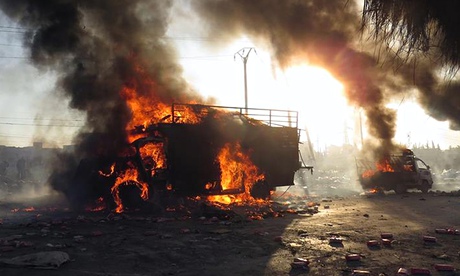
The aftermath of a
barrel-bomb attack in Aleppo in January: amore than 250 people are
reported to have died in similar assaults in the past six days.
Photograph: AP
Aid operations are due to start in besieged areas of Homs, a US official said, as Syria and the UN agreed to hold a "humanitarian pause" on fighting in the devastated city.
The agreement came as an
NGO said more than 250 people died in regime barrel-bomb attacks on
Aleppo, with the UN secretary general, Ban Ki-moon, condemning the
assault.
Clashes between rebels
and troops raged inside Aleppo's central prison, after Islamist fighters
freed hundreds of prisoners, the Syrian Observatory for Human Rights
said.
A week after the
situation in besieged districts of Homs was discussed at peace talks in
Geneva, state news agency Sana said agreement had been reached to allow
aid in and safe passage out for civilians.
"Homs governor Talal
al-Barazi and UN resident coordinator Yaacoub El Hillo have reached an
agreement securing the exit of innocent civilians from the Old City and
the entrance of humanitarian assistance for civilians who choose to
stay," it said.
The UN announced there
would be a "humanitarian pause", with spokesman Farhan Haq citing the UN
under secretary general for humanitarian affairs and emergency relief,
Valerie Amos.
The deal clears the way
for delivering lifesaving supplies for about 2,500 trapped civilians,
with activists saying people have survived on little more than olives
for weeks.
Sana said "the relevant Syrian authorities will implement the deal by providing the necessary humanitarian assistance".
State department
spokeswoman Jen Psaki said: "We understand the operations will begin
tomorrow, Friday morning, and will include a local humanitarian pause
while the evacuations take place and while the food and other
humanitarian assistance is delivered."
Rebel-held districts in
Homs have come under nearly daily shelling since the army blockaded them
in June 2012. Among the besieged residents are at least 1,200 women,
children and elderly people, the Britain-based Observatory says.
In Geneva, the Office of
the High Commissioner for Human Rights said food and supplies had been
placed on the outskirts of Homs but they would not be delivered until
safety was assured.
"They're not going to
travel by night, but the agreement for delivery is there, and that is
what we are welcoming," OHCHR spokesman Jens Laerke said.
"You may only hear about the actual delivery when it has taken place. And that is simply to ensure the safety of our staff."
In Aleppo, meanwhile,
the Syrian Observatory said more than 250 people have been killed in six
days of regime barrel-bomb attacks, as a coalition of rebels announced a
new military operation in the province.
The UN condemns barrel-bomb attacks
"The secretary general
is following with deep concern the continued armed escalation in Syria,
most deplorably the ongoing aerial attacks and the use of 'barrel bombs'
to brutal, devastating effect in populated areas," said Ban's
spokesman, Martin Nesirky.
"He condemns once again
the indiscriminate use of any weapon against civilians, in contravention
of obligations under international humanitarian and human rights law,"
Nesirky said. "All civilians must be protected in any situation."
The Islamic Front, which
groups tens of thousands of rebels, and the al-Qaida franchise Al-Nusra
Front announced a joint operation called "Truthful Promise Approaches",
a reference to a passage in the KQur'an.
The announcement came as
the army seeks to take territory in the rebel-held eastern part of
Aleppo city. The ground campaign has been accompanied by daily aerial
attacks since Saturday by barrel bombs dropped from helicopters.
These attacks have
killed at least 257 people, including 76 children, and wounded hundreds
more, the Observatory said. Widely condemned as indiscriminate, the
bombing has sparked a mass exodus from the worst-hit neighbourhoods in
the east of the city.
Just outside the city, rebels and jihadists assaulted the central prison, freeing hundreds of detainees, the Observatory said.
But the NGO's director,
Rami Abdel Rahman, said the army took back the initiative after Ahrar
al-Sham – part of the Islamic Front – and al-Nusra had captured large
parts of the sprawling complex.
An Ahrar al-Sham fighter
told AFP clashes were continuing, and state television said the attack
was repulsed. The assault began with a suicide attack by an al-Nusra
fighter at the prison's main entrance.
In New York, the UN
security council demanded Syria move faster to remove its deadly
chemical weapons stockpile and meet a 30 June deadline set for
destroying its arsenal.
The 15 member nations
"call upon the Syrian Arab Republic to expedite actions to meet its
obligations", the council's president for the month, Lithuania's UN
ambassador Raimonda Murmokaite told reporters.
The chemical weapons
must be transported to the Syrian port of Latakia "in a systematic and
sufficiently accelerated manner", he insisted.
President Bashar al-Assad has
pledged to eliminate Syria's entire chemical weapons arsenal by the end
of June or face sanctions, including the possible use of force.
Less than 5% of the
stockpile has been removed from Syria, according to Washington, and
Damascus has just missed another key deadline.

No comments:
Post a Comment